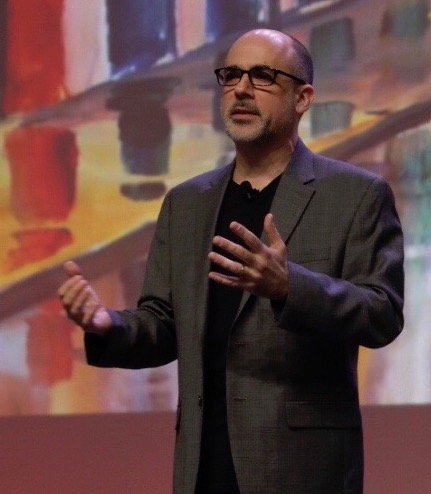
Editor's Note: This roundup, intended for executive directors and temple administrators, is part of a series of pieces that curates coronavirus response resources for specific congregational roles. Additional pieces in this series are available for clergy, presidents, ECE center directors and educators, and Jewish K-12 educational leaders.
In these unprecedented times, you’re likely receiving a bombardment of information, resources, and ideas.
To help you keep it all straight and find what you need, we’re keeping this ongoing list of Reform Movement resources that may be particularly useful to you in your work as an executive director or temple administrator.
1. Access savings for virtual operations.
We recently announced the launch of the Reform Movement Marketplace, which offers low-cost, convenient access to high-quality products and services to help URJ congregations with day-to-day operations.
Of particular relevance:
- Virtual programming tools: As you move meetings and programs online, access savings on Streamspot’s video streaming software and hardware and Zoom savings on virtual meeting tools.
- Wifi: Techsoup offers savings on mobile 4G hotspots for easy wifi access to stream worship and education programming.
- Home office needs: Is your staff set up for working from home? Back Office Cooperative offers savings on monitors, office supplies, cleaning supplies, and more.
2. Navigate current leadership and decision-making challenges.
- [Webinar] Reimagining What's Possible - The Next Phase in a COVID-19 World: URJ Vice President of Strengthening Congregations, Amy Asin, recently discussed how congregations can imagine the possibilities of a hybrid society, experiment and innovate, and rebuild for new realities.
- "How to Navigate Leadership During This Unprecedented Time": URJ Vice President of Strengthening Congregations, Amy Asin, shares a three-stage framework to help congregational leaders steer through this unique moment – plus resources to help in each stage.
- Preparing for the High Holidays in Challenging Times: This collection of Reform Movement resources, webinars, and study opportunities can help you and your congregation prepare for High Holidays 5781.
- [Webinar] Making Difficult Employment Decisions Within a Sacred Partnership: The Reform Pay Equity Initiative, URJ, WRJ, WRN, and NATA recently partnered to share the best practices and concrete tools needed to make equitable decisions regarding employment matters such as salary cuts, layoffs, and furloughs during these challenging times. This training is for both professional and lay leaders who are involved in making, or impacted by, these decisions.
- Questions to Consider: In partnership with organizations across the Reform Movement, we’ve compiled a list of questions your congregational leadership should consider on suspension of services, event refunds, facilities, and more.
- Responsibility Chart: This guide may help your congregational leaders on making go/no-go decisions about programming and more.
3. Assess possible scenarios.
- [Video] URJ Guide to Budget Scenario Planning: Trying to analyze different budget scenarios for your congregation? This video provides guidance for congregations - with and without professional staff assistance.
- Scenario Planning Worksheet - the Quadrant Method: This worksheet will help your congregation analyze possible outcomes based on different variables of your choice.
- [Webinar] Applying Scenario Planning to High Holidays 5781: Amy Asin, URJ Vice President for Strengthening Congregations, recently hosted this webinar to help congregational leaders - both individuals and teams - prepare for this year's High Holidays.
4. Consider congregational finances.
- Apply for a Federal grant to cover congregational salaries: The Small Business Administration is making $30 billion in loans available to small businesses, including synagogues. These loans cover salaries – including benefits, paid leave, severance, and more – up to $100,000 per employee, with a maximum loan amount of $10 million. In most cases, they can turn from loans to grants. The loans are offered on a “first-come, first-serve” basis, so you need to act immediately. The URJ has trained volunteers to help Reform congregations navigate the application process.
- [Webinar] The Payroll Protection Program and Your Congregation: We are partnering with the Jewish Federations of North America (JFNA) to offer this upcoming webinar (date and link TBD). Experts from the JFNA will discuss the unique questions synagogues have about the new guidance issued by the Small Business Administration regarding the Payroll Protection Program loan forgiveness application.
- [Webinar] Congregational Fundraising in the Face of COVID-19: Amy Schiffman, consultant and coach from Giving Tree Associates, recently partnered with us to share strategies to continue building relationships with members and donors in a crisis environment. Topics included virtual galas, mailings, special campaigns, and solicitations during a time of extreme uncertainty and how to develop a plan of action.
- [Webinar] Congregational Finance and COVID-19: What Your Congregation Needs to Know: We recently hosted three webinars on finances - for small congregations (250 member units and below), for mid-sized congregations (251-749 member units), or for large congregations (750 member units or more). Topics included the stimulus package, “what if” budget scenarios, staffing logistics, and more. The content of the call was tailored, based on congregation size.
- [Webinar] Top 10 Questions about Congregational Finances in Light of COVID-19: We recently hosted a webinar to discuss the top 10 questions we’ve been hearing from you about finances and how to move forward with optimism.
5. Master the logistics of engaging members online.
- [Webinar] Zoom Training for Clergy, Educators, and Lay Leaders: Zoom is a flexible and powerful tool for virtual meetings that can help maintain social connections amid physical distance. This tutorial focuses on the needs of clergy, educators, and lay leaders.
- “How to Stream Services (Or Anything Else): A Guide for Jewish Communities”: Designed to help congregations new to streaming, this resource includes explanations, step-by-step directions, a technological checklist, copyright information, and more.
6. Talk to other executive directors.
NATA is hosting "Coffee/Cocktail/Schmooze Zoom Calls," which provide NATA members the opportunity to engage with each other and share stories about how they and their communities are responding to the pandemic. Information will be emailed directly to NATA members.
7. Communicate with congregants.
- Sample Email: Not sure what to say in your email to congregants about event cancellations and building closures? Start here and tweak as needed.
- "Judaism Under Quarantine: Helpful Content to Share with Congregants Right Now": This comprehensive list is being regularly updated with relevant Jewish content you can share on congregational social media, in emails, and more.
8. Connect with other Reform Movement leaders.
Join the COVID-19 Responses group in the NATA-Net Yammer network to access NATA’s new COVID-19 resource, ask questions, and share your experience with other NATA members.
Additional resources are also available in The Tent by searching for #Coronavirus.
9. Browse the full list of URJ resources on coronavirus response.
Looking for something more specific or want to review everything we have to offer? Check out “How Reform Congregations are Coping with COVID-19 (and Tools to Help),” which is being updated as new resources become available.
Let’s join virtual hands of support and remember the text from Deuteronomy Rabbah 1:10: “A community is too heavy to carry alone.” Together, we will make it through these difficult times and will find ourselves and our communities to be stronger for it.
Related Posts

Setting Your Leaders Up For Success

Safety, Equity, and Accountability is the Path to a Thriving Jewish Community

